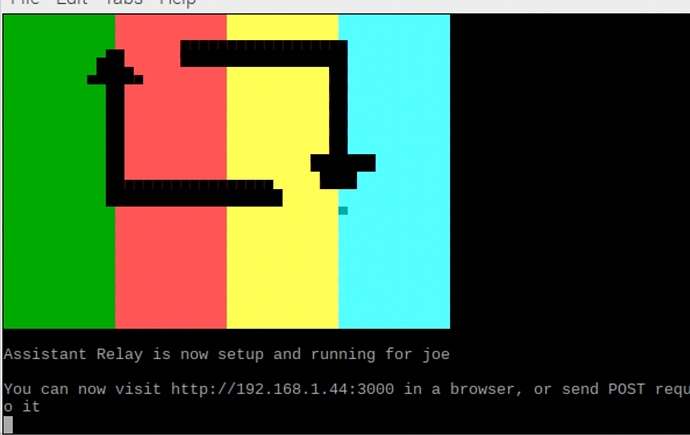Sorry, forgot you were trying v2, that's V1. Did you run npm install again after swapping node versions?
Yes and it appeared to have worked
what is the filename for your oauth file? Confirm your node version with node -v. What is the contents of your conig.json in /server/configurations?
I just love it when that happens? What was the final thing? Renaming the oauth?
I redid the auth url. And renamed it
Now I just need to learn how to use this. My whole plan was to have my Google home mini speak. I don't know what the web page does
Check out the readme here:
Ok it's working. Ty for all your help and patience. I just want to know how to setup a rule like if switch turned on have the relay speak it
Then I suggest you read through this topic:
Have you installed my Hubitat Driver for Google Assistant Relay v2 yet? Once you install the driver, and then manually Add a Virtual Device that uses the driver, you will enter in your Raspberry Pi's IP address and Port that Assistant Relay is running on.
Follow the guide at
Once you have the driver working and tested, you can then use this device in Apps like Rule machine that support Speech Synthesis or Notification devices.
I was one of the early adopters of the Greg relay.
I eventually drop it, when he moved into V2 and requiring Curl post to be defined. It stopped to be user friendly to create rules and automation.
When you had several Pistons and rules, managing and mantaining/update/tweaking become to cumbersome with Curl, hence I ditched TTS
I wish there was a more elegant solution to TTS, simpler to install, and simply to use. Sadly I'm no coder so wouldn't know where even to start.
Ideally there you would be a package that you would download, would automatically check your system for installed requirements and validate them, than install all required modules and dependecies, requests you Google API credentials and would be done.
Second part of it would be an App that you would install and that automatically communicates with the relay and creates the internal connections with the relay by defining the ip on the app (without create virtual devices) and establishes all the required variables in RM.
But I guess I'm on daydreaming mode today.
Yes and works. Ty
I was actually surprised to see everyone embedding http calls into webCoRE over on SmartThings in order to use the assistant-relay NodeJS server. On Hubitat, I chose to simplify things for users... ![]()
With my Google Assistant Relay Driver for Hubitat, there is no need to know curl, or any of the behind the scenes http formatting complexity. Just reference the device in RM or any other app that supports the Speech Synthesis or Notification capabilities, and pass the text you want spoken. That's it.
So, while not a trivial initial setup process, the use of it is extremely easy.
I still have v1 installed on one of the RPI.
Might give it a go once the hub arrives
Just be sure to use my V1 Driver at Hubitat/google-home-assistant-relay.groovy at master · ogiewon/Hubitat · GitHub
V1 works absolutely brilliant. I’ve not found a reason to update yet. I stopped using it for TTS because of the pre-announcement you can’t turn off, so I’m using my funny Google Assistant Relay, to SmartThings, to Alexa workflow for that, and it works really well.
I just use Google assistant relay to silently control unsupported devices from HE. Very good tool for that purpose. Highly reliable and pretty consistently fast for cloud.
Don't remember any announcements...
I'm getting old. Will need to test it out.
When you send a TTS message now to google assistant via Google assistant relay, it speaks, “broadcast from [your user account name]”, and then it delivers the message.
Didn't do that when I played with it. Was long ago though. It only had a beep and than the broadcast.
It’s a server side change that happened a few weeks ago. Cannot be disabled. Only happens for broadcast. Does not happen when sending silent commands.


